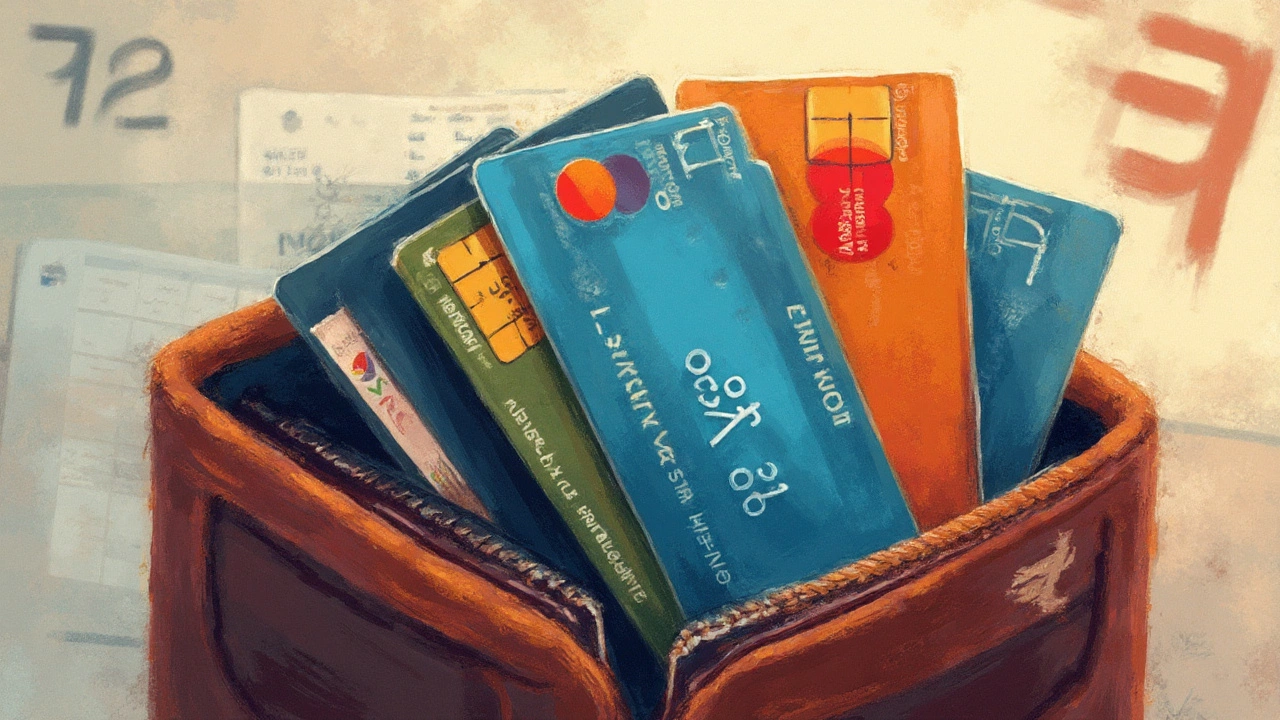Ever find an old credit card in your wallet and wonder, “What happens if I just let this thing sit around?” It’s one of those money questions that sounds simple, but the answer isn’t just yes or no. Some people swear by keeping their cards locked away, never swiping them even once, convinced they’re being super responsible. Others say you’re just begging for trouble if you let a credit card gather dust. Which side gets it right? There’s a bunch of moving parts behind this, from how card companies look at your habits, to how credit bureaus score your every financial move. If you care about your credit score, your financial security, or you’ve ever wanted to outsmart the banks (legally!), it pays to know the real story.
What Happens to an Unused Credit Card?
Okay, so you tossed that card in the drawer and forgot about it—what’s actually going on in the background? First, your issuer (that’s your bank or card company) still keeps the account open, unless you ask them to close it. Which might sound fine… until it isn’t. Many issuers have a secret timer on rarely used cards. After about 12 to 24 months of zero activity, they quietly shut down your account. No big dramatic warning. Sometimes, it’s just a polite letter or an email tucked away in your spam folder. In 2023, data from Experian showed around 22% of closed credit card accounts were shut down due to inactivity, not because of the customer’s request.
Why does this happen? Card companies want active customers—they earn money from interest and swipe fees, not from people who lock their cards away. An account that just takes up space in their system is a cost, not a profit. That said, they’re not required to close it; some issuers keep it open for years. If your account gets shut down, you risk more than a small inconvenience, and it’s this next part that usually trips people up—changing your credit score.
Let’s talk numbers. Your available credit—the total of all your open lines—plays a pretty big role (about 30%) in how your credit score gets calculated. If your card with a $5,000 limit is suddenly closed, your overall available credit drops, which jiggles your credit utilization ratio. Your utilization basically tells the world how much debt you have compared to your total limits. Say you owe $2,000, but all your credit limits add up to $10,000—your ratio is 20%. Less is better. If one card closes and now you have $5,000 available instead, your ratio jumps to 40%! That’s a red flag for lenders. Point is, keeping that card open—even if you rarely use it—usually helps you more than it hurts.
But what if you think, “I’ll never use this, can’t the issuer just leave it alone?” Sure, sometimes. Banks aren’t all playing by the same rulebook. American Express, for example, is more likely to close for inactivity than, say, Capital One, which has a reputation for leaving cards alone for ages. Even so, there’s no hard and fast rule, so you can’t assume any issuer will let things ride forever. Some folks have had cards open for years without a single transaction, but that’s as much luck as it is policy.
One other thing—fraud. Cards you never use but keep open can be a low-key risk. If your card details get compromised, you might not notice charges right away because you’re not checking your statements. My son Tristan accidentally discovered old, unused store cards in a drawer at my place, and that’s exactly what made me check for weird charges—luckily, nothing had happened, but it could’ve gone the other way.
Does Having an Unused Card Hurt Your Credit Score?
Here’s where things get more interesting. Leaving a card open but unused is often good for your credit score, at least in the short run. Remember the credit utilization thing? The more available credit you have without running up big balances, the better you look to credit bureaus. Keeping an old card open boosts that top number, dropping your utilization ratio, and making you appear responsible—even a financial superhero!
Your credit score isn’t just about what you owe. It’s built out of several big pieces. Let’s break it down—
| Factor | Weight in Score |
|---|---|
| Payment History | 35% |
| Credit Utilization | 30% |
| Length of Credit History | 15% |
| Types of Credit | 10% |
| New Credit | 10% |
Unused cards help especially with “Credit Utilization” and, if it’s an old card, with “Length of Credit History.” That last one’s important: the longer your accounts stay open, the older your average credit history becomes, which lenders like. Letting your college-era card sit open—even if you don’t touch it—can help here.
But there’s a flip side. If you stop using your card and it gets shut down by the bank, two things can hit you. First, your credit utilization ratio gets worse, because your overall credit goes down. Second, if it’s your oldest card, you’ll eventually shorten your average account age. Credit bureaus stop counting closed accounts in your history after seven to ten years. So, if you’re planning for a mortgage, losing that old unused card two years before buying your dream house could sting.
One thing you don’t need to stress over? Issuers don’t penalize you for having zero balances—so ignoring the card won’t tank your score. But when the card disappears, that’s when your numbers might wobble. Regularly check your credit reports (at least once or twice a year—get one from each bureau for free at AnnualCreditReport.com), especially if you have unused cards lying around. This gives you a heads up if anything unusual happens.
And for folks who worry about annual fees on unused cards: there’s really no upside to paying for a card you’re not using. Unless that abandoned premium card gives you extra benefits (like travel perks you still use), it’s usually smarter to close it and avoid wasting money. Before you close a card with a fee, though, see if you can downgrade to a no-fee version—it keeps your credit line open without the annual hit to your wallet.

Reasons You Might Keep (or Close) That Dormant Card
Alright, let’s get practical. Why bother keeping an unused card in the first place? Honestly, sometimes it just makes life easier. Say you’re rebuilding credit after a rough patch, or you simply want a safety net for emergencies. Having a chunk of available credit you never touch can lower your stress. Plus, if you ever need a quick boost (booking a vacation, unexpected car repairs), you’ve got options.
But maybe you’re tempted to cut that card up right now. It’s not crazy—there are real reasons to close unused cards. The most obvious is if the card has an annual fee but isn’t giving you any meaningful benefit. Or, maybe you have too many cards and it’s getting hard to keep track. More cards means more statements, more passwords, more chances for something to slip through the cracks. Did you know, according to J.D. Power’s 2024 survey, over 27% of Americans who experienced credit card fraud last year only caught it after weeks because it happened on cards they never check?
There are also folks who just want to streamline their life—less clutter, less temptation to spend. If you have a card with a sky-high interest rate, it’s not a bad move to ditch it (just pay off any balance first). Another thing: if you’re trying to get a loan soon, losing available credit or closing your oldest card can ding your score at the worst moment. Think about timing before making big changes.
And then there’s the “what’s the harm?” crowd. As long as the card isn’t costing you money or tempting you to overspend, keeping it open and dormant could be the best of both worlds. Use it for a small, regular bill—like a streaming service or your Netflix subscription—pay it off automatically, and you’re building up account activity without risking debt. If you hate autopay, just set a calendar reminder to put a tiny charge on the card every few months. You’ll keep the issuer happy and avoid any sudden closures.
One thing to keep in mind: some people have a habit of opening store cards for discounts and forgetting about them. Those cards usually have tiny limits, high rates, and may get closed quickly if left alone. Over time, closing multiple store cards could stack up and hurt your overall available credit. Picking which dormant cards you keep might be just as important as deciding to keep any. Focus on cards with no fees, low rates, and long history.
Tips for Managing Unused Credit Cards
If you decide not to use a credit card but want to keep it, here’s how you do it smart. First, put a small, recurring charge on it. Maybe it’s your Spotify account or a cloud storage fee—something tiny. Pay it off automatically each month. Issuers love seeing life in an account, and a few charges a year are usually all it takes.
Set reminders, either with your calendar or financial apps, to check statements every couple of months. Even if you’re not using the card, watch for weird activity. You don’t want to be the person who spots fraud after it’s ballooned for months. My trick: every three months, I sit down with Tristan and do a quick card audit. We make it a game to spot “funny money”—a good finance habit for both dad and kid.
No-fee cards are the best for this, hands down. Cards with annual fees? Only keep them dormant if the card’s perks outweigh the cost. If not, try to product-change to a no-fee card—almost every major bank offers one. This keeps your line open and history strong without the added cost.
Want to close a card? Start by paying it off. Next, call your issuer and ask if closing the account will affect your credit. Some banks will let you transfer your limit to another card you already have with them, which softens the blow to your total available credit. After closing, keep an eye on your credit report for a few months. Glitches sometimes happen!
Don’t forget to update payment info on any bills tied to the card you’re about to close. You don’t want your Hulu to suddenly stop because you forgot to swap cards. It happens to the best of us.
If you’ve got a pile of old cards, check the expiration dates and shred any that are expired. Be careful with your info. Some cards can be recycled, some can’t—check your bank’s policy.
Finally, teach the younger folks in your life how to manage cards, even unused ones. Bad habits carry over fast. A little openness about credit—what to keep, what to close, and why—can save years of headaches down the road.
Money habits build up from everyday decisions, not big dramatic gestures. Whether you keep that unused credit card or finally close it is less important than how you manage the details. Small moves, checked statements, and a little bit of planning: that’s what actually keeps your credit healthy and your finances solid.


